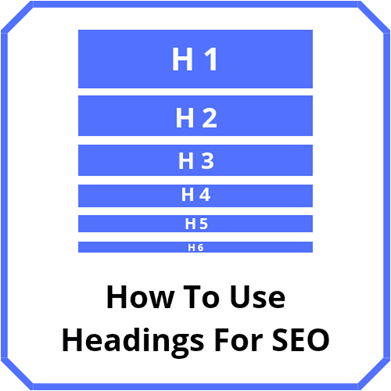John Mueller, in his recent Webmaster hangout, gave a clear explanation of how Google uses H1, H2, H3 HTML headings in SEO. Check it out below.
Here is the question addressed by John Mueller:
A long question on headers and H1, H2, H3… What is the best setup?
This is what John Mueller said in response:
“I think in general, headings are a bit overrated in the sense that it’s very easy to… get pulled into lots of theoretical discussions on what the optimal headings should be.
We do use headings when it comes to search. But we use them to better understand the content on the pages.
So… this question of… how should I order my H1, H2, H3, headings and what should the content be, that’s something from my point of view isn’t really that relevant.
But rather, what we use these headings for is well we have this big chunk of text or we have this big image and there’s a heading above that, therefore maybe this heading applies to this chunk of text or to this image.
So it’s not so much like there are five keywords in these headings, therefore this page will rank for these keywords but more, here’s some more information about that piece of text or about that image on that page.
And that helps us to better understand how to kind of frame that piece of text, how to frame the images that you have within those blocks. And with that it’s a lot easier to find… the right queries that lead us to these pages.
So it’s not so much that suddenly your page ranks higher because you have those keywords there. But suddenly it’s more well Google understands my content a little bit better and therefore it can send users who are explicitly looking for my content a little bit more towards my page.
So obviously there’s a little bit of overlap there with regards to… Google understanding my content better and me ranking better for the queries that I care about. Because if you write about content that you want to rank for which probably you’re doing, then being able to understand that content better does help us a little bit.
But it’s not that suddenly your page will rank number one for competitive queries just because you’re making it very easy for Google to understand your content.
So with that said, I think it’s useful to… look at the individual headings on a page but… don’t get too dug down into all of these details and variations and instead try to find a way to make it easy for people and for scripts to understand the content and kind of the context of things on your pages.”
Key Takeaways
John Mueller clarifies that adding keywords in headings is not a sure-fire way to rank better.
Heading Tags are essential to communicate what a web page is about or what the information on your webpage is all about.
Headings help Google send users who are looking for content like that which you feature towards your page. It is also useful for the readers or visitors to understand the content on a page before they visit it.
Take a look at what John Mueller has to say about optimizing heading tags in this Youtube video.
For more such current digital marketing news updates, subscribe to our blog.
Popular Searches
How useful was this post?
0 / 5. 0

















